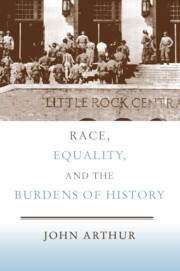6 - Compensatory Justice: Restitution, Reparations, and Apologies
Published online by Cambridge University Press: 03 December 2009
Summary
whatever their defenders may have thought, slavery and other forms of racial oppression are now recognized for the enormous moral evil they were. Many believe that poverty and other problems facing a quarter of today's African-Americans are traceable at least in part to the lingering effects of that shameful history. Vincene Verdun, for instance, writes that differences in the rates of “unemployment, income, mortality rates, substandard housing and education” are the “effects of over 300 years of oppression.” Owen Fiss expresses that view beginning with the title of his book: A Way Out: America's Ghettos and the Legacy of Racism. I argued in Chapter 5 that although it is controversial and hard to specify with any precision, historic oppression did contribute to the problems facing African-Americans. It did so by encouraging rumors of inferiority and undermining the cultural commitment to educational achievement. In this chapter, I discuss a proposal that has gained considerable support recently. That proposal usually goes under the somewhat misleading title of reparations, though compensatory justice is more accurate since reparations are only one form that compensatory justice can take.
Justice can take many forms; some are backward looking. Compensatory justice is concerned not with improving current institutions and practices to make them more just but rather with compensating victims of past wrongs. Even if current social institutions and laws were perfectly just, it would still be possible that individuals deserve some form of compensation for past wrongs.
- Type
- Chapter
- Information
- Race, Equality, and the Burdens of History , pp. 198 - 227Publisher: Cambridge University PressPrint publication year: 2007

